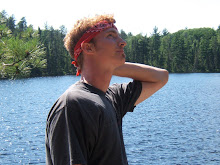There is a tendency when studying any academic discipline to for us to fall into the monotony of dispassionate engagement. We read the books, write our papers, fill the requirements and hammer out our blogs. In such a process it's easy to get lost, become disconnected and then finally move on to the next academic assignment that may be in our Que. Yet there is something about studying ecology, the environment and education that simply won't let us go there right away. It nags on us. Every time we throw away a plastic bag, or every time we stay in the shower for a minute longer than necessary, we feel just a little twinge of guilt.
In fact it's hard not to feel just a little bit guilty after reading Sandra Steingraber's Living Downstream. The book of course is not about the water that we waste, or the plastic bags that we throw away, it's about her fight against cancer and the farm industry's use of hazardous chemical agents. And even though she doesn't speak against my own particular wasteful habits (unless buying non-organic groceries counts) I find myself reflecting on her story when I look around at my own contributions to the degradation of the environment. And I wonder why that is. Is it because I feel personally guilty about her situation? Not particularly. Maybe it has to do with the fact that I want to avoid getting cancer myself. Or maybe it's something else altogether.
What Steingraber does particularly well in her book was to paint a picture of connectedness. Ultimately, we would all like to divorce ourselves from the consequences of our actions. The environment will just take care of DDT right? One plastic bag thrown away won't hurt anybody right? One extra minute in the shower isn't going to drain Lake Superior will it? Yet when you put a human face and a human emotion to the problem it becomes a lot harder to throw away that plastic bag. You start to feel just a little bit guilty for using up so much water. Certainly Steingraber's book taught me things that I didn't know previously, but more importantly, it demonstrates the connectedness of everything we do. The pesticides that we use are causing cancer and destroying lives. Armed with this knowledge, how is it that I continue to buy groceries from non-organic sources?
Education can only take us so far. Without a face to connect to or without a story to share, doing the little that help the environment start to seem more bothersome than helpful - more hopeless and less hopeful. So I think that Steingraber's greatest contribution is not that she informed us about the dangers of pesticides, but that she put a face and a story to the problem. Her story makes us care. And what can education do if we don't care? If we lack the passion to educate people about the destruction of the earth, then as educators and leaders, we have failed entirely. What the ecological movement needs then, more than numbers and statistics, are stories. More accounts of people being affected by environmental disaster is what is required for real change.
As a future pastor and leader of the church, my hope for myself is that I continue to tell the stories that matter both to God and to ourselves. Stories like Steingraber's that capture our hearts much more than they capture our minds (though careful thought, logic and consideration should always come first). The possibility for change lies mostly in our capacity to care for and love not only our neighbors, but also the environment in which we live.
Thursday, April 22, 2010
Subscribe to:
Post Comments (Atom)

Yes! You wrote "her story makes us care" -- and that's at the heart of any kind of learning. I hope this will be lesson that you continue to return to!
ReplyDelete